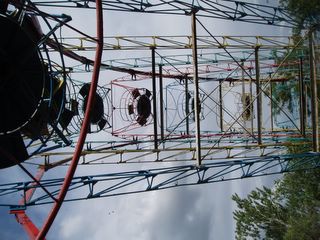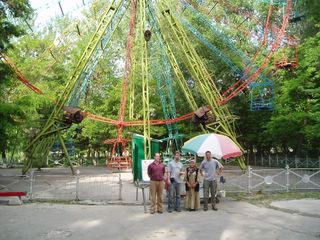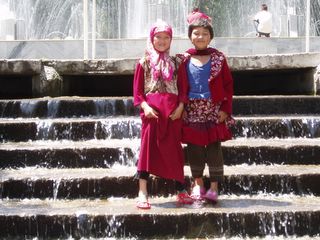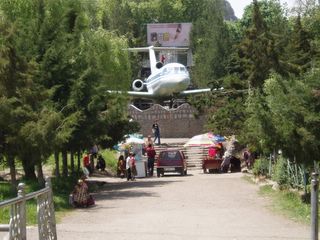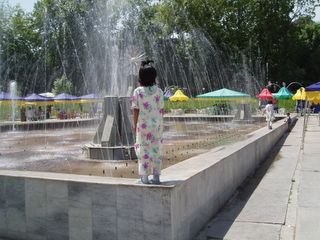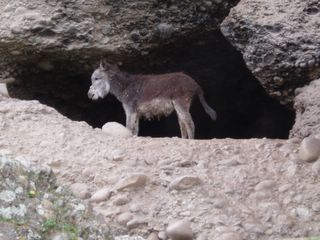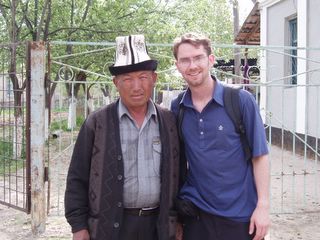Mr. Alex Boston and Mr. Craig Lamberton:
Peace Corps placed me with the Human Rights & Democracy Center (HRDC), located in Osh, Kyrgyzstan. At the time I learned of my placement, I was told that I would be working with one of the best NGOs in Kyrgyzstan. This has proved true. HRDC consists of fourteen employees, nine of whom are licensed advocates (attorneys). HRDC is a highly respected, non-governmental, apolitical organization that promotes Human Rights by providing indigent clients with free legal advice. The Democracy portion of HRDC’s title is fulfilled by educating law students, secondary-school students, attorneys, judges, police, local officials and citizens on the constitution and normative laws of the Kyrgyz Republic.
HRDC’s work in human rights and democracy manifests itself in three ways. First, it provides free legal advice and representation to those who are unable to afford an attorney. Second, it raises the level of education among students through legal clinic programs. And, third it develops civil society and social awareness by educating the populace on the laws of the Kyrgyz Republic.
HRDC’s primary work is conducted through their three legal clinics. Two of the three legal clinics unite law students from three competing institutions by creating a venue that provides students with practical experience in both the civil and criminal arena. Select groups of students from these institutions are taught how to interact with clients, legal research skills and trial skills. After receiving in-depth training, the students’ clinical education culminates in providing pro bono assistance and representation to those who are unable to afford an attorney. This is all done under the presence and with the supervision of a licensed HRDC staff attorney.
The third legal clinic focuses on civic teaching methodologies for secondary school teachers. The goal of this clinic, entitled “Street Law Clinic” is to train teachers in interactive methods of civil education and to increase school children’s knowledge of the laws of the Kyrgyz Republic.
HRDC’s attorneys are greatly respected for their knowledge, energy and their non-partisan, apolitical approach to improving civil society in the Kyrgyz Republic. Many organizations, universities and even secondary schools have taken a political stance and have supported particular candidates or parties, over the last few months. I know of at least two universities in Osh alone, where the rector’s (each running for a parliamentary seat) ran political campaigns on their campuses. However, throughout the recent elections and their aftermath, HRDC has remained an independent and non-political entity.
In fact, because of HRDC’s highly respected independent status in the Kyrgyz Republic, organizations such as the ABA/CEELI, OSCE and IFES have sought the assistance of members of HRDC in implementing civic education programs. Last fall, HRDC implemented a program which educated over 1,000 physicians and teachers about proper local election’s procedures in the Kyrgyz Republic. They taught intelligent people, interested in the democratic process, about the laws of their country.
I find it somewhat incredible to believe, after all of the hard work I was told Peace Corps was doing to find appropriate placements, that Peace Corps did not know my organization was educating over 1,000 teachers and physicians on the electoral process.
More recently, several volunteers and staff of HRDC were approached by IFES (specifically because they were known to be non-partisan) and asked if they would be willing to supervise the technical procedures in several local elections. On voting day, these individuals checked people’s identification cards and sprayed their hands with a fluid that only becomes visible under a black light.
While I am aware that the Peace Corps office in Washington D.C. is concerned about the perception of volunteers being involved in political activities, I think it is a far stretch to say that working with people who teach the law and supervise the logistical and technical aspects of the electoral system on election’s day rises to a level political activity that warrants removal from an organization.
Throughout history, universities have been very involved in the political arena. The universities in Kyrgyzstan are no exception. As stated above, two rectors from two universities in Osh, Kyrgyzstan were political candidates in the parliamentary elections. Not only did they participate directly in the political process, they appropriated their institutions for the purpose of promoting their campaigns. Faculty and students were “strongly encouraged” to campaign and vote on their behalf. Yet, Peace Corps volunteers remain at these institutions which are publicly known to promote political candidacies.
Now, one could argue that a university’s main focus or objective is education and not politics and I think this is a good argument. I also believe that it applies to my organization. Everyone knows that HRDC’s focus is legal education. Why would Peace Corps send me to an organization titled the Human Rights & Democracy Center—if the organization’s focus was political? They wouldn’t. The only difference between the universities I spoke of above and my organization is that the universities were known to be overtly political and even corrupt, while my organization is known to be non-political and law-abiding.
I would also like to discuss the personal bonds I have established with my organization. The people who work at HRDC are some the brightest and kindest people I have encountered in the world. In December, as a new Peace Corps volunteer, my-coworkers took a pay cut in order to pay for my housing. They have become my best friends in Kyrgyzstan. They’ve invited me into their lives, broken bread with me and shared their hopes and dreams. It takes quite a while to establish the trust and bonds that we’ve established. They’ve invested a lot of time and energy in teaching me about Kyrgyzstan. This time and energy has detracted from other projects that they could have been working on.
Only recently have I begun to feel like I could start paying them back for all of their generosity and patience and investment in me as a volunteer. In April, we submitted a concept paper to USAID. I have included this concept paper as an attachment because I thought you might be interested in the kind of work we do here at HRDC.
In addition to everything that I have written above, I also have some questions for Peace Corps. I know you are worried about the perception of Peace Corps volunteers working with NGOs involved in politics. Since most NGO’s act as a nexus, bridging gaps between governments and their people, it seems that most NGOs could be perceived as political. Is Peace Corps going to terminate their work with NGOs all around the world because of the fear of potentially being perceived of as working with organizations who are involved the political process?
What are you going to do about all those who teach at overtly political universities? Could you please explain the difference between teaching at a university that is known to be political and teaching at an NGO that is known to be non-political? Please explain why it is OK for PCVs to continue working at the former and not the latter.
If you remove me from my organization, will you reimburse HRDC for the housing costs they’ve incurred? Believing that I would be able to assist them over the next two years, HRDC has invested time, energy and money into training me and familiarizing me with their organization. They have spent 2,500 som per month on housing alone. As you know, this is a large sum of money for most people in Kyrgyzstan. Out of a sense of fairness and justice, I deeply believe that if Peace Corps pulls me out of the organization before they can reap the benefits I have to offer, then Peace Corps should bear the burden of their decision and reimburse my organization for their costs in housing me.
Where am I going to be placed? I have been told by everyone who encounters HRDC (including two University of Montana law professors who were at my organization yesterday) that I am working with one of the best organizations in Kyrgyzstan. I completely agree with them. If I am moved are you going to try and find a solid organization that matches my skills and interests or be satisfied with any organization not “perceived to be involved in the political process?”
Are you going to remove me from Osh where I have spent nearly ¼ of my Peace Corps service, adjusted to the environment and established many friendships?
As the gravity of your potential decision begins to weigh on my mind, I am sure that I will have many more questions. I hope that Peace Corps finds the time to provide some thoughtful answers.
Sincerely,
Larry Tweed




